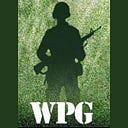Turn Your Radio On
By Doug Bradley
Midway through my 1970–71 tour of duty in Vietnam, a fellow GI invited me to join him at his weekly religious service. Aaron was the only African American soldier in our Information Office unit at U. S. Army Headquarters in Long Binh, and he and I had bonded over music and civil rights. Plus, Aaron guaranteed that his “church service” was going to be like nothing my lapsed-Catholic self had ever encountered.
“Brother Bradley,” Aaron smiled. “You’re gonna get your fill of one BIG, BLACK, BAPTIST celebration steeped in ‘call and response.’ You’ll never look at religion the same way again.”
Was this really happening in Vietnam of all places which seemed more like hell than heaven? Indeed it was, given the large numbers of African American troops in Vietnam, and many of them based at Long Binh. I was nervous, and soon realized I was the only white guy in the congregation that night. When the preacher approached the makeshift podium, he started singing an old 1930s spiritual:
Turn your radio on, Turn your radio on
And listen to the music in the air.
Turn your radio on, Turn your radio on,
Heaven’s glory shared, glory shared.
I was reminded of this moment recently when I attended Texas Tech University’s annual Vietnam conference. This year’s theme was “1974: Shattered Peace, Continued Conflict, and Preparing for the Final Battle for Vietnam,” and I was one of the conference presenters. Radio was on my mind, as it always is when I talk about Vietnam, but that pastor’s song kept coming back to me because I’d never heard it before and would never in a million years equate radio and Vietnam with God and Heaven.
But, as Sonny and Cher once opined, “the beat goes on…”
And the beat at this Texas Tech University conference, at that moment, was about the pain, loss, and suffering of the South Vietnamese as the war was spiraling out of their control. When I looked around the room, I suddenly realized that nearly half of the faces, and the experiences, were Vietnamese. And then I listened to the presentations of two former South Vietnamese ARVN soldiers (ARVN stood for Army Republic of Vietnam, to be distinguished from the NVA, North Vietnamese Army, and the Viet Cong).
First, Hieu Vu, a professor at Fort Hays University, painted a harrowing portrait of the 92nd ARVN Rangers and the Battle of Ton Le Chan in 1974. As I and others in the audience listened, we were transported back there with the ARVN rangers, marveling at their resilience and fortitude. Radios were omnipresent, but there wasn’t any music playing…
Next we heard from Michael Do, an ARVN veteran who fought for more than a decade, received a purple heart among other medals, and was a prisoner in a re-education camp for ten years after the fall of South Vietnam. Proud, bitter, and irritated, Mr. Do talked about the continued American misunderstandings of the sacrifices of its South Vietnamese allies. His 50-year old anger was palpable.
By the time I made my presentation about the treatment of U. S. Vietnam veterans in America in 1974, I played a song from 1974 radio — “Billy Don’t Be a Hero” — realizing I was clueless about what, if any music, my Vietnamese comrades heard on the radio or elsewhere.
Later, during a reception, I overheard a conversation among a handful of the Vietnamese participants about this exact topic. One of them was reminding the other of a Vietnamese entertainment troupe called Hoa Tình Thương, (translation The Love Flowers). They were comprised of civilians and South Vietnam army personnel. Turns out that Hoa Tình Thương performed mainstream Vietnamese rock and other popular upbeat styles to ARVN soldiers across South Vietnam from 1970–73. How had I missed this? Maybe because they weren’t on the radio?
After the conference, I came across an article by Sheila Ngoc Pham about her mother’s participation in Hoa Tình Thương during the war. As she pointed out, “for the South Vietnamese, one of the best weapons they had left was vibrant contemporary music; it was something they had that the Communists didn’t.”
But, sadly, she recalls her mother saying “I thought we would win. I didn’t know we’d lose.”
Could music lose a war? Or the lack of it?
Or maybe we lost the war on the radio? I heard Hanoi Hannah, the North Vietnamese equivalent of World War II’s Tokyo Rose, on the radio in Vietnam, but I never heard Hoa Tình Thương. Nor did I hear any indigenous Vietnamese music, other than the ones our hooch maids sang when they made our beds and cleaned our clothes. Or maybe I’d missed the message from the pastor during that rollicking 1971 Baptist service, since I hadn’t listened “to the music in the air” in Vietnam.
Yes, I heard lots of music in Vietnam, mainly ours. I had all that and more in the rear. And yes, we and the ARVN lost. But we only know the complexities and complications of that thanks to the good folks at Texas Tech who have amassed the nation’s largest and most comprehensive collection of information on the Vietnam War. They and the work they do, need our support.
And perhaps even a song on the radio.
# # #
(Vietnam veteran Doug Bradley is the author of Who’ll Stop the Rain: Respect, Remembrance, and Reconciliation in Post-Vietnam America, co-author with Craig Werner of We Gotta Get Out of This Place: The Soundtrack of the Vietnam War, which was named best music book of 2015 by Rolling Stone magazine, and DEROS Vietnam: Dispatches from the Air-Conditioned Jungle now available as an audiobook. His music-based memoir, The Tracks of My Years, will be released by Legacy Book Press in 2025.)
